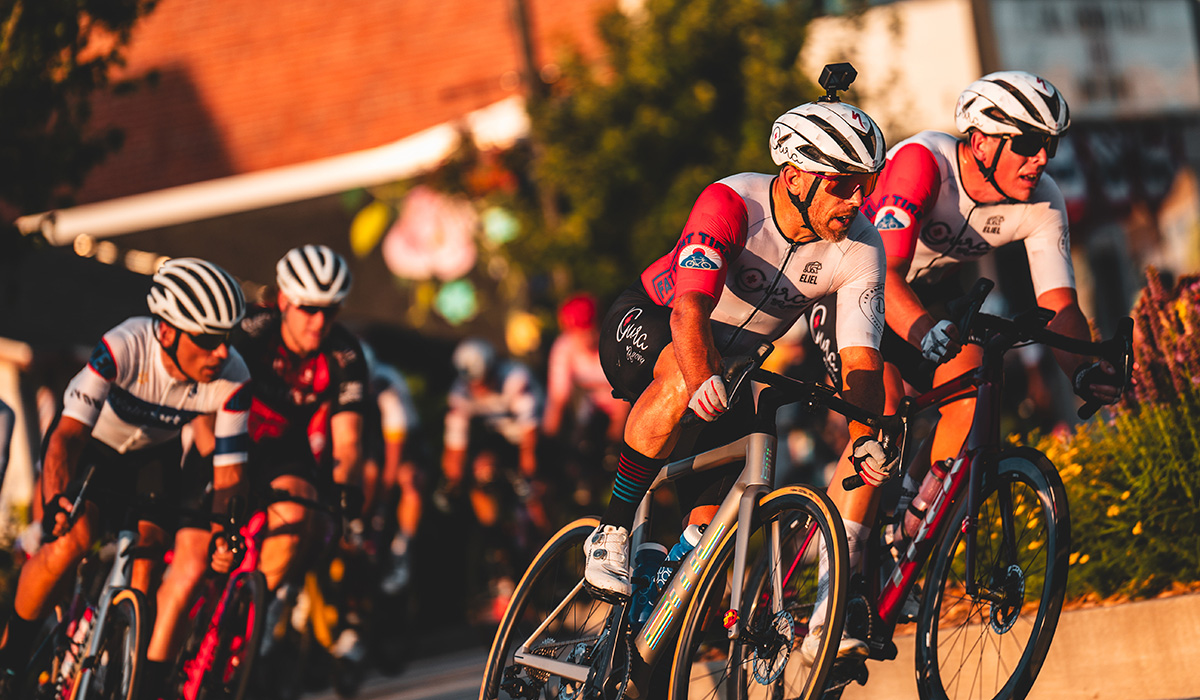Three Nights in
Springdale
The Natural State Criterium Series is just what Arkansas needs.
By Bryce Ward | Photography by Kai Caddy

TAKING THE CORNER: Racers fly through downtown Springdale.
Three nights a year, cyclists converge from across Arkansas, and even from bordering states like Missouri and Oklahoma, to compete in the Natural State Criterium Series in Springdale. In 2023, the third annual edition of the series attracted more than 120 racers across four categories in each of its three races, with field sizes ranging as large as 54 riders. For a criterium that takes place on a Wednesday night in Arkansas, and for cyclists who have become accustomed to competing in sparsely attended races in parking lots and deserted business parks, this is a race of significant size.
Not only are the fields much larger than a typical weeknight criterium in Arkansas, but they are also more competitive. This past year, the A race — the fastest of the four categories — had in attendance professional racers from teams like the Miami Blazers and Austin Aviators, and many racers from amateur level teams as well. The lower categories were also as competitive as any weeknight criterium in the south-central region, with field sizes ranging from the 30s to 40s. I have competed in each edition of the Natural State Criterium over the past three years, and I can personally attest that it is a much harder race than it used to be.
Aside from the steadily expanding field sizes and increasingly competitive races, the event as a whole has become more and more of a spectacle, so much so that it has begun to reel in people from outside Northwest Arkansas’s tight-knit cycling community. The course, a roughly 1-mile-long winding loop through the heart of downtown Springdale, is well-suited for spectators.
The start/finish stretch is lined with local breweries and restaurants. A DJ sets up equipment on the sidewalk and blares upbeat music. The announcers’ voices bellow through loudspeakers as they narrate the race. And crowds of people, cyclists and noncyclists alike, gather around the barriers to watch the race pass by, lap after lap, hour after hour, until finally the sun sets and everything is packed away, leaving no trace of the carnival-like experience that transpires three nights a year in the downtown streets of Springdale.
After this past year, the grandest edition of the NSC yet, I wondered why and how this bike race has been able to defy the fate of so many weeknight criteriums and grow to become something of not only local, but regional significance. After sitting down with the promoter of the race, Bruce Dunn of All Sports Productions, and talking with him for over an hour at a local coffee shop, the reasons for the NSC’s success became apparent.
Its unprecedented primes (which are cash or merchandise prizes awarded to the winner[s] of a particular but not final lap) has surely helped. The aptly named “gambler prime” awarded to the winner of the third-to-last lap reached as high as $1,000 — the most prestigious criteriums in the nation rarely have primes of this size, even at the professional level. And that is only one of the many sizable primes yelled out through the PA system over the course of a night.
Cyclists of all levels, from avid recreationalists to gravel pros, have been trickling into the region over the past few years.

SPRINT FOR THE FANS: The start/finish stretch is rowdy as fans hang out in front of several restaurants and bars.
The recent influx of cyclists into Northwest Arkansas has also helped. Cyclists of all levels, from avid recreationalists to gravel pros, have been trickling into the region over the past few years. Some visit for a while to experience the widely publicized trails and scenic, steep and winding rural roads. Others move here altogether. The NSC, positioned in the heart of it all, has benefited from this growth.
All Sports Productions has also done a great job with the race. The course is well-designed and engaging for both racers and fans. It has eight turns that riders can carry speed through, a junction near the finish that allows spectators to watch multiple parts of the race, and a fast, slightly downhill stretch with technical turns on the backside. It’s much more entertaining, and much better for cyclists trying to become better racers, than the standard four-corner criterium.
Each of these factors has contributed in varying degrees to the success of the NSC, but Dunn will be the first to tell you they are not the most important. Most road cycling races — whether short downtown criteriums or long rural road races — inextricably depend on the cities that host them. In other words, the success of a race (if hosted on public roads) is contingent on a city’s willingness and desire to not only accommodate, but support it. The city leaders in Springdale — namely Jill Dabbs, executive director of the Downtown Springdale Alliance, and Mike Gilbert, local businessman and the madman behind the primes — deserve a lot of credit for the NSC’s growth.
Since the inception of this weeknight criterium series, Springdale has provided a level of support rarely seen from cities, particularly in the United States. They enabled All Sports Productions to create a safe and entertaining course in the heart of downtown. They provide the labor necessary to set up and take down the barriers before and after each race. They are the ones to thank for the live music, and the even livelier primes. And perhaps most importantly, they have taken it upon themselves to communicate with the local businesses affected by the race and make a concerted effort to help educate the Springdale community at large about the value of an event like the NSC.
“We’re in charge of the racing,” Dunn said, “Springdale is in charge of the show.”
Northwest Arkansas has received a lot of publicity in recent years as a blossoming destination for cyclists.

PROS COME TO PLAY: Top riders are no strangers at the Natural State Crits. Austin Aviators Connor White of Bermuda won a race last May.
The significance of Springdale’s support cannot be stressed enough, for the NSC has become more than a bike race. On one hand, the series has filled a long-vacant gap in the Arkansas road racing calendar. It provides local cyclists with multiple opportunities throughout the year to experience a high-level criterium without the high level of risk associated with the much larger and restless fields of national-caliber races (looking at you, Tulsa Tough). It’s just hard enough that it pushes you to become a better racer and bike handler, but not so hard (and dangerous) that it deters you from racing altogether. Whether you’re thinking of trying out a criterium for the first time, or striving to climb up the categories, or if you simply want to have fun racing your bike without having to drive for hours on end, it doesn’t get much better than the NSC. It’s everything a weeknight criterium should be.
On the other hand, the NSC — more so than any local race I’ve been a part of — is introducing bike racing to people who may have otherwise never been exposed to the sport. During our conversation in the coffee shop, Dunn fondly recounted a story that encapsulates this point: He encountered a man who was excitedly trying to articulate an event he and some friends were going to later that night in which “there’s these bikes going ‘round and round!’”
I have seen it myself too. A few times, while waiting around for my race to start, I have been approached by individuals with perplexed faces who are eager to learn about those bikes going ‘round and round.’ Some — not realizing that the event is going on — merely stumble into the strange world of criterium racing, while others — even if they do not fully understand it (yet) — actively seek it out. At the very least, the NSC is giving people something to look forward to on a Wednesday night, but in my opinion, the series is much more meaningful than that.
Northwest Arkansas has received a lot of publicity in recent years as a blossoming destination for cyclists. We have an overwhelming amount of mountain bike trails, an extensive paved-trail system for commuting and recreation, a world-class cyclo-cross venue, top-tier gravel events, a global cycling apparel company, a bike manufacturing company — heck, we even have a bikeable building.
While these investments have no doubt had a positive effect on the region’s cycling scene, it’s important for us not to lose sight of the grassroot events that bring people together. We need races like the Natural State Criterium Series, but more importantly, we need city leaders like those in Springdale who understand the value that cycling can bring to their communities.
If you have not been to one of the NSC races yet, I highly encourage you to go check one out. The best way to understand the value of an event like this is to experience it for yourself.


